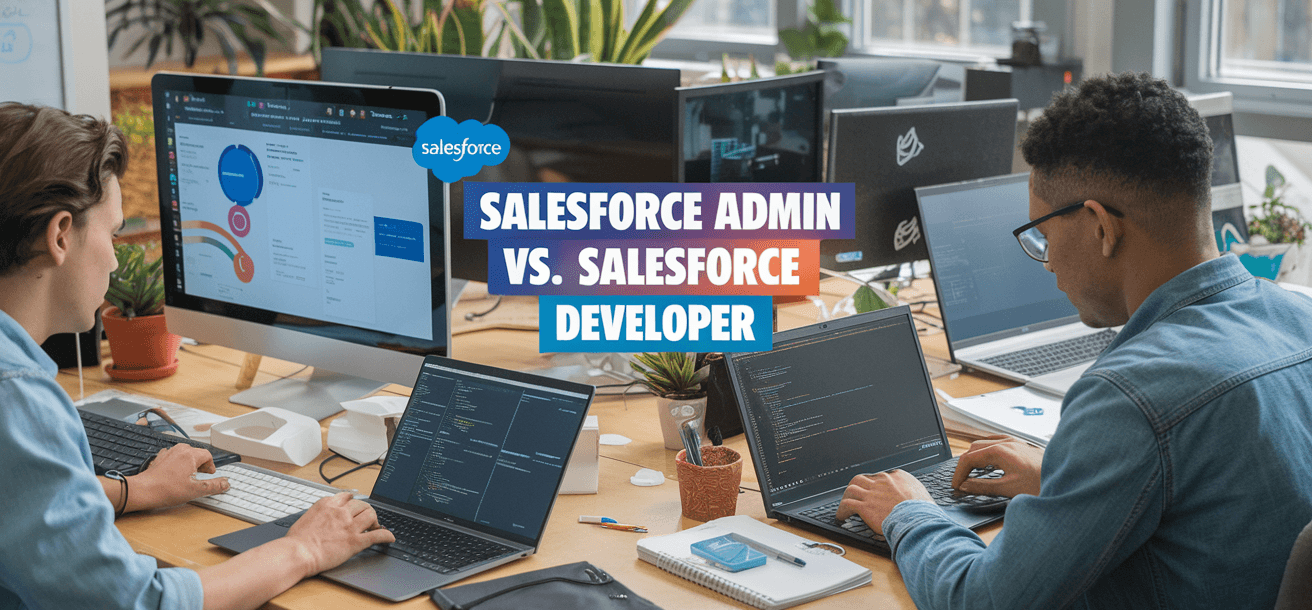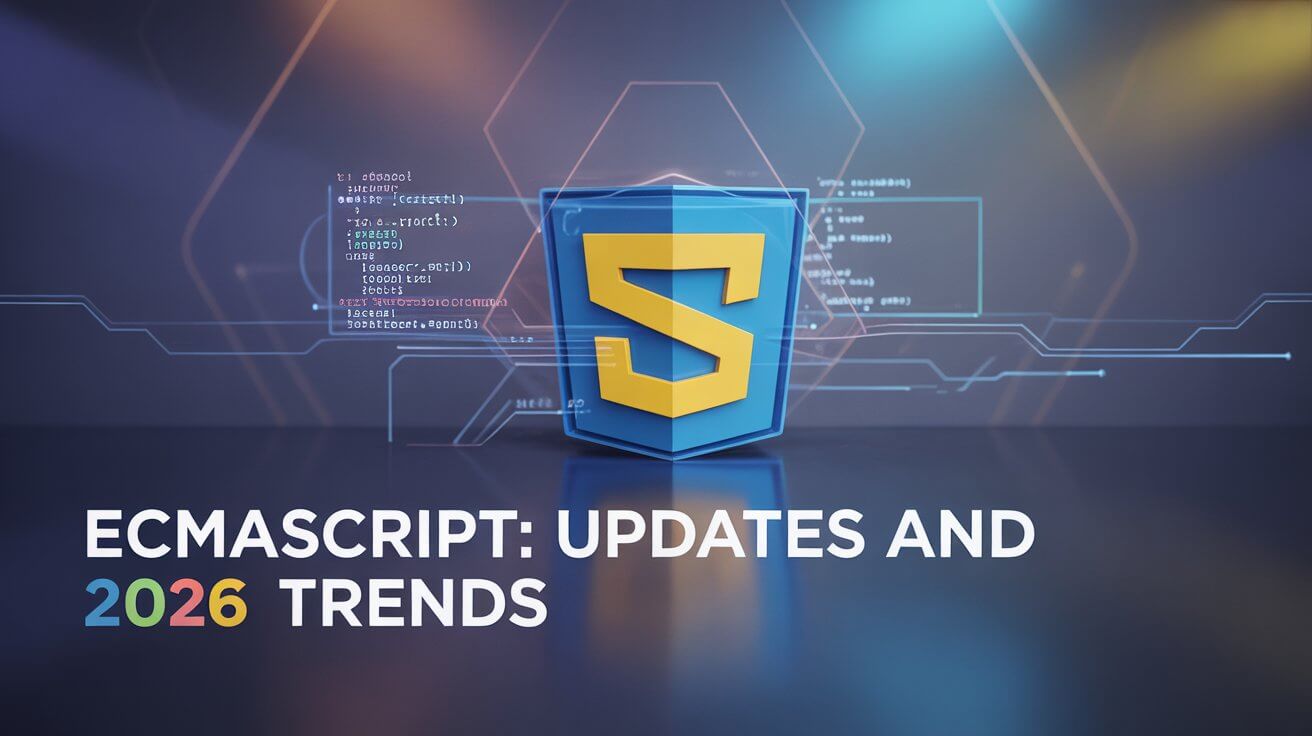Salesforce being one of the leading cloud-based Customer Relationship Management (CRM) solutions has changed the ways businesses communicate with their customers. Crest provides full solutions in sales, marketing, services, and others which help organisations to reduce their costs and enhance the satisfaction of the customers. Within the Salesforce ecosystem, Salesforce Admin and Saleforce Developer roles are instrumental in driving organizational success. It is important to understand that both of these roles i.e. Salesforce Admin Vs Salesforce Developer and how they contribute a lot to Salesforce implementations. But their responsibilities and skills are quite distinct.
Through this blog you will explore the differences between these two positions and to define clearly how their skills, responsibilities, and possibly the careers contingent upon them may differ. To achieve that, one needs to realize objectives and responsibilities of each position to decide whether to become a Salesforce Admin or Developer.

Jump ahead to
Salesforce Administrator
Administrators are the pillars of all Salesforce projects. The role involves in configuring and managing Salesforce Org for the new, unique needs of the organization. They are more or less the translators of business necessities and technological possibilities, with the goal of optimizing Salesforce for company.
Key skills and responsibilities of a Salesforce Admin include:
Configuring Salesforce Settings and User Profiles: Organizational customization or mapping the system with the structure and functionalities of the organization by configuring settings, roles, and access rights.
Managing Data and Reports: Data cleansing, data validation and generation of relevant reports which helps in maintaining accuracy of the data. Reporting and ‘slicing & dicing’ of business data for the purpose of analysis and generating useful information.
Providing User Support: Giving support to the end-users with regards to using Salesforce, fixing problems, and providing information.
Implementing and Maintaining Salesforce Applications: Implementing and supporting several Salesforce solutions, e.g., Sales Cloud, Service Cloud, and Marketing Cloud.
If one chooses a career as a Salesforce Admin, then there are many opportunities and variety of the work. With increased years of work, they could be promoted to positions like Salesforce Architect, Salesforce Consultant or the Salesforce Project Manager. The salaries of a Salesforce Admin vary USD 75,000 – USD 135,000 (annually) based on the experience and geographical zone.
Salesforce Developers
Salesforce developers are the core technical persons who are responsible for development and configuration of salesforce for certain purposes. The holders know better the architecture of the platform and the language it uses.
Key skills and responsibilities of a Salesforce Developer include:
Writing Apex Code: Customisation which involves creating additional code on the platform thereby enhancing its features through the Salesforce programming language known as Apex.
Developing Custom Applications and Integrations: Designing applications for the clients and linking Salesforce with other systems to improve efficiency of the business’s operations and effectiveness of the data exchange.
Designing and Implementing Salesforce Solutions: Evaluating organizational requirements and defining Salesforce solutions in concordance with the strategic intent.
Troubleshooting and Debugging Code: Preventative; recognition and rectification of concerns in respect of Salesforce solutions for maximum efficiency.
Promotion and advancement opportunities are usually quite pronounced in the career development of a Salesforce Developer. Depending on the years of experience the individual may be promoted to the higher position. It includes Salesforce Technical Architect, Salesforce Solution Engineer, or a Salesforce Consultant. The salary for this job starts from USD 113,000 and goes up to USD 200,000 depending on the experience years and skill set for a Salesforce Developer.
Salesforce Admin Vs Salesforce Developer
| Feature | Salesforce Admin | Salesforce Developer |
| Skills | Configuration, data management, user support | Apex coding, application development, integration |
| Responsibilities | Managing Salesforce settings, user profiles, and data | Developing custom solutions, troubleshooting code, and integrating with external systems |
| Career Paths | Salesforce Architect, Consultant, Project Manager | Technical Architect, Solution Engineer, Consultant |
| Salary Range (India) | USD 75,000 – USD 135,000 | USD 113,000 – USD 200,000 |
Salesforce Administrators and Developers, though, are two different roles there are tasks that may seem to belong to one role but are actually more ideally done by the other. For instance, the Admins occasionally cover writing a simple Apex code for some of the changes as Developers may engage in supporting the users.
Salesforce implementation success is decorated by the cooperation that usually happens between an Admin and a Developer. Platform owners contribute the base that they set up and organize the access while Coders expand capacity through bespoke applications. Thus, clients can receive highly effective Salesforce solutions that address increasing business requirements with the clients’ support of these partnerships.
Conclusion
It is important to note that Salesforce Administrators and Saleforce Developers are significant in the achievement of Salesforce’s implementations. While admins deal with configuration and operational aspects of the platform the developers leverage it with solutions.
The value of both such roles cannot be overemphasized in today’s world of business. Salesforce Admins make the most logical use of the platform when it is being implemented to deliver efficiency as well as accuracy while Developers come up with exciting solutions that can impact the business.
If you are interested in technology and customers’ relations, you can succeed if you become a salesforce employee. Why the administrative functions attract you or why you find yourself interested in the technical side of the work. There will always be a position that would fit. Join us and walk around the world of Salesforce. Find out how you can build a bright career here helping organizations around the world to succeed.
FAQs
What is the typical career path for a Salesforce Admin?
Salesforce Admins often start as entry-level positions, gaining hands-on experience with Salesforce configuration and administration. They can then progress to more senior roles like Salesforce Lead Admin or Salesforce Administrator Manager.
What are the essential skills and certifications for a Salesforce Admin?
Essential skills include understanding of Salesforce fundamentals (objects, fields, records, reports, dashboards), configuration (workflows, approvals, validation rules), and administration tasks (user management, data migration, data cleansing).
What are the essential skills and certifications for a Salesforce Developer?
Essential skills include Apex programming, Lightning Web Components, Visualforce, SOQL, and understanding of Salesforce architecture. Certifications like Salesforce Platform Developer I and II are highly valued by employers.
Is there a significant difference in job satisfaction between Salesforce Admins and Developers?
Job satisfaction can vary depending on individual preferences. Admins often enjoy the satisfaction of streamlining processes and improving user experiences, while Developers might find fulfillment in creating innovative solutions and technical challenges.
Which role offers more opportunities for remote work or flexible schedules between Salesforce Admins and Developers?
Both roles can offer opportunities for remote work and flexible schedules, depending on the company and project requirements. However, Developers might have more flexibility due to the nature of their work.
Is it possible to transition from Admin to Developer or vice versa?
Yes, it’s possible to transition between Salesforce Admin and Developer roles. While there might be a learning curve, the foundational knowledge of Salesforce can be beneficial for both roles.
What are the long-term career prospects for Salesforce professionals?
The Salesforce ecosystem is growing rapidly, creating ample opportunities for career advancement. As Salesforce continues to dominate the CRM market, demand for skilled professionals will likely remain high.



